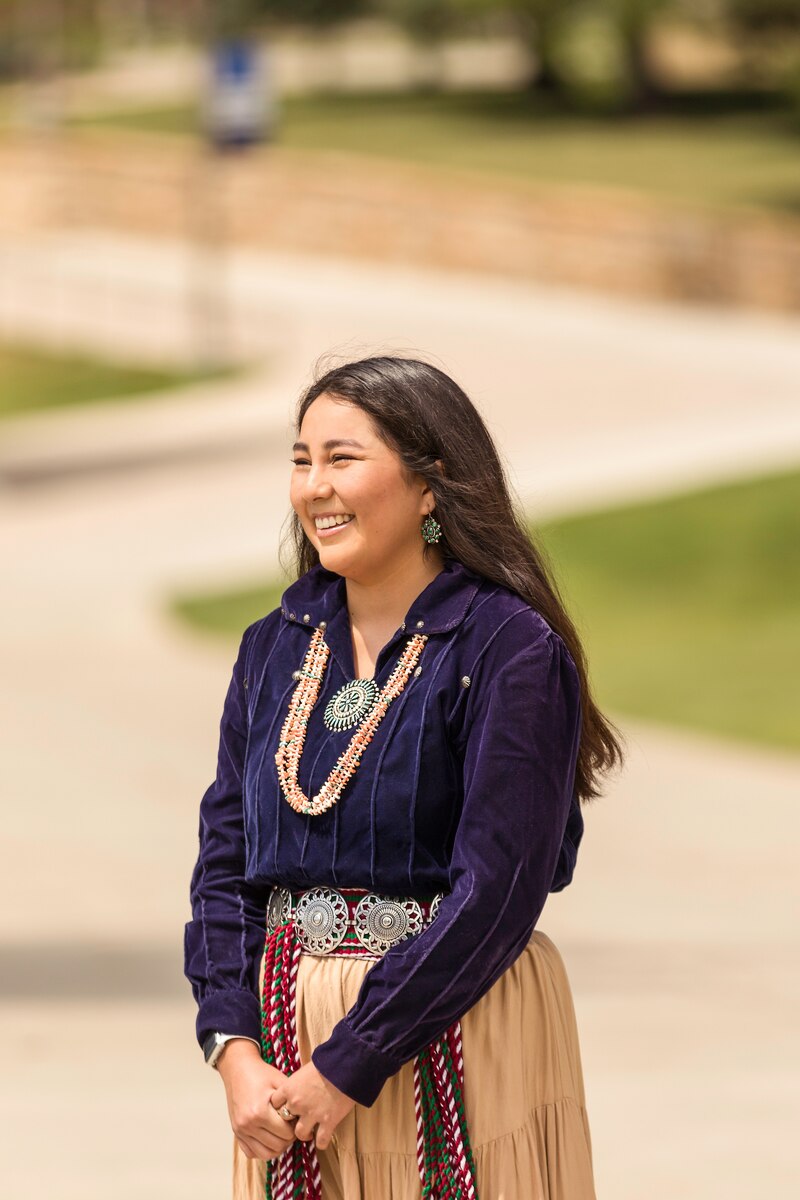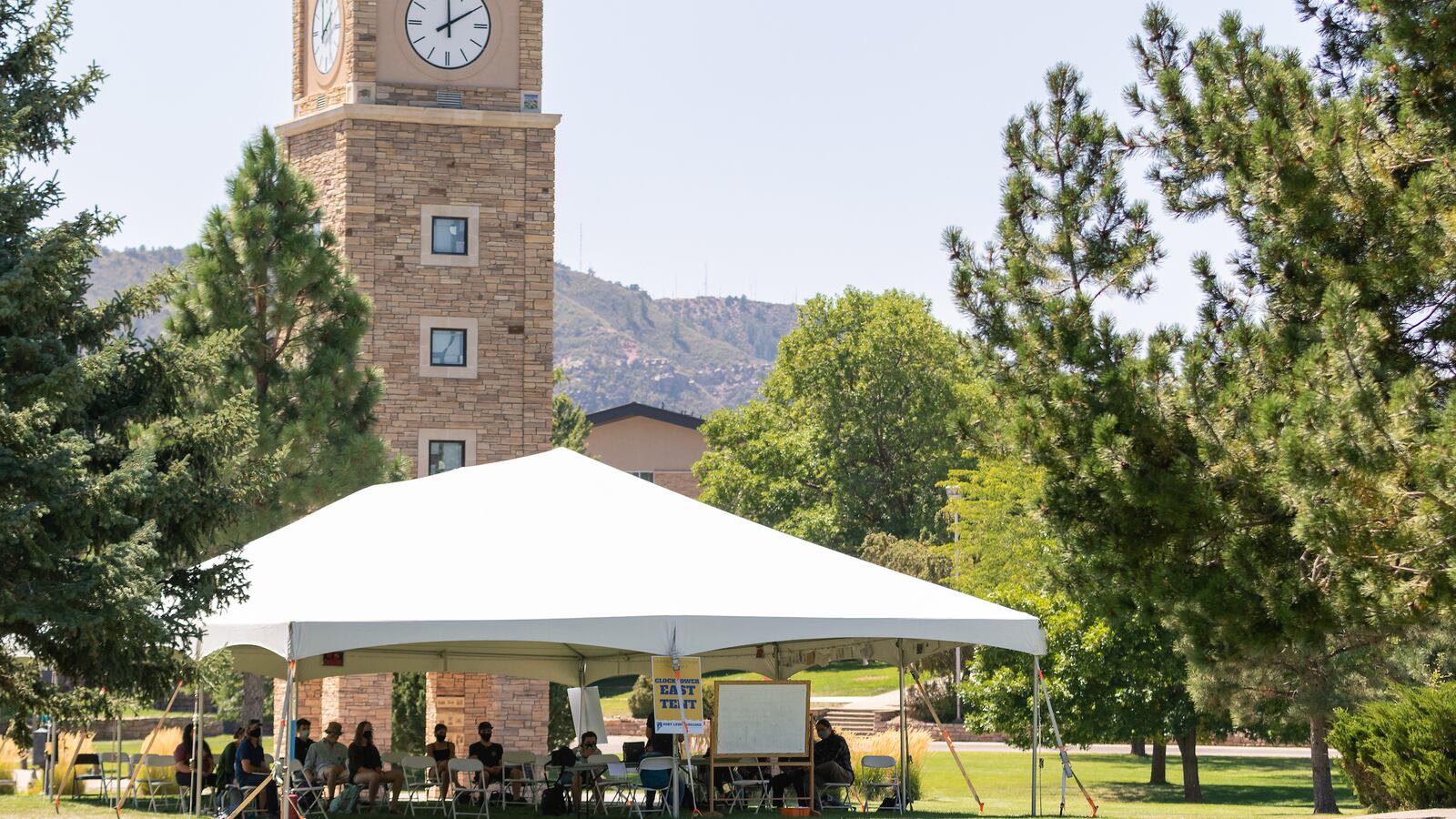Fort Lewis College senior Ally Gee watched as COVID-19 devastated the Navajo Nation and took the lives of two loved ones.
The overwhelming impact the coronavirus is having on her life prompted her to share with her school in Durango the Diné, or Navajo, concept of K’é, meaning kinship. The philosophy, which Gee said is sacred to the Navajo Nation, is guiding the southwest Colorado college’s response to staying safe during the pandemic.
Inspired by Gee, Fort Lewis College honed a strategy that so far has tempered the spread of COVID-19. The 3,300-student public college has had 24 cases among students, faculty, and staff this fall. That’s a standout amid colleges and universities that are coping with outbreaks.
Broadly, in Indigenous cultures, K’é encompasses mutual respect among all living things. It is demonstrated by making decisions to benefit the greater community, Gee said.
The school crafted a campaign around the concept that employed social media to promote togetherness and a YouTube video of Gee speaking to students. She cast the best practices in pandemic prevention — wearing masks, keeping a safe social distance, and thinking through their actions to keep others safe — as behaving responsibly to the community.
“I’m very passionate about making sure that no one else loses their life to this virus,” said Gee, 21, a public health major. “It’s super important to me that at Fort Lewis we’re taking care of one another.”
The approach draws from the strengths of the school’s Indigenous students, empowers students to mold campus culture, and elevates the strategy’s effectiveness, said Fort Lewis College President Tom Stritikus.
When the idea came to his desk, he said, “it just felt like it was a no-brainer in so many ways.”
“The only thing I did here was I just didn’t stand in the way of a good idea,” Stritikus said.
In crafting a campus strategy to fight the coronavirus, Sara Newman, a professor specializing in public health, wanted to create something that embodied the school’s identity. At Fort Lewis College, about 40% of the school’s population is Native American, with over 170 tribes represented on the campus, according to the school’s website.
“It’s really well documented that America is an individualistic society,” Newman said. “But a strength that we have as an Indigenous-serving institution is that many of our students, their cultural background does place the community higher than the individual.”
Although Newman has worked on public health with Native American people since 2009, she said she didn’t have the cultural background to craft a way to reach students. She also didn’t want to stigmatize students already dealing with some of the worst impacts of the coronavirus.

Newman recruited Gee, a student in her classes and a leader on campus, to help create the plan.
The virus has hit the Navajo Nation hard, she said. The Navajo Nation has recorded some of the highest rates of infection in the country. It has suffered at least 562 deaths among 10,546 cases, according to the Navajo Times.
Stritikus said the school requires masks on campus, conducts classes outside, randomly tests students and staff, and does contact tracing. Fort Lewis also has contracted with hotels to spread out students so they aren’t as densely congregated in campus housing.
Fort Lewis’s 24 cases compare with more than 1,500 cases among the University of Colorado Boulder’s students, faculty and staff. CU Boulder is much larger, but also has had a higher rate of COVID infection.
A spike in cases at CU Boulder prompted the administration to move classes online for several weeks, and local public health officials to ban gatherings of people ages 18 to 22. Officials believe off-campus parties were a major driver of the outbreaks, despite a campaign called “Protect Our Herd” to foster individual accountability for students.
Cases have since declined, and CU plans to bring back in-person classes in mid-October.
Schools across the country have paused in-person instruction or gone fully remote after outbreaks. That’s something Fort Lewis hopes to avoid.
Stritikus said the student-driven approach to health is crucial for Fort Lewis College. He expressed gratitude to Gee and other students.
“We approach this with a huge degree of humility,” Stritikus said. “We’ve had some success, maybe partially luck. But we also know it can change in a moment’s time.”
Gee said she has learned that how she as an Indigenous person views health care is important not only to her, but also to the world. Mental, physical, emotional, and spiritual health are crucial to the Diné, she said.
And she is heartened that other students have embraced the concept that everyone is mutually tied together — and that by respecting others, you respect yourself.

